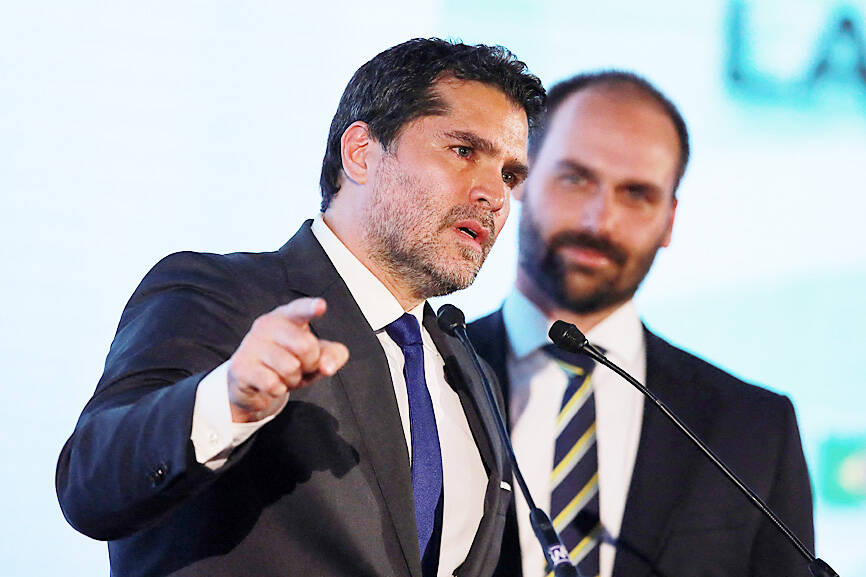At an upscale Mexico City hotel on Friday, several hundred right-wing activists and international allies gathered to carve an identity for Mexico’s fledgling conservative movement just as governments across Latin America swing left.
The US-based Conservative Political Action Conference (CPAC) — which has boosted far-right leaders such as former US president Donald Trump, Brazilian President Jair Bolsonaro and Hungarian President Viktor Orban — is scheduled to hold its first offshoot event in Mexico on Nov. 18 and 19.
The meeting follows a wave of leftist electoral victories in Brazil, Chile, Colombia and elsewhere that have cast doubt on the far right’s strength in Latin America, as it rallies against perceived adversaries in the media, pop culture, electoral agencies and big tech.

Photo: Reuters
“This is a global movement right now, and the reality is we are under complete assault,” former Trump advisor Steve Bannon said in a streamed address, claiming that Brazilian president-elect Luiz Inacio Lula da Silva stole the country’s election from Bolsonaro. Lula is to be sworn in on Jan. 1.
Bolsonaro’s son Eduardo was scheduled to speak later on Friday. Worries about the left’s return in Brazil and elsewhere in the region were front and center, followed by anger about changing gender values, including transgender issues.
American Conservative Union chairman Matt Schlapp said in opening remarks that his “biggest worry” was the “march of godless communism” from Latin America to the US.
Trump, star of CPACs past, was not present, and none of his family members appeared on the speaker lineup. Just one attendee donned a red Trump cap.
Speakers, who included activists and media personalities from around the world, called for new leaders to fight the spread of “socialism,” “globalism” and “woke” culture in Mexico and elsewhere in the region.
“The right, the true right, has been orphaned,” said Eduardo Verastegui, a Mexican soap actor turned anti-abortion advocate who helped organize the conference.
The far right does not play an influential role in Mexico, where left-leaning President Andres Manuel Lopez Obrador enjoys one of the hemisphere’s highest popularity ratings.
“A new right is needed, at least here in Mexico,” said Andres Burgueno, 28, who traveled from Mexico’s western Sinaloa state to attend the conference. “Right now what we see is really center-right, or centrist.”
On Nov. 13, opposition groups protested Lopez Obrador’s proposed reform of Mexico’s electoral institute in the largest demonstration against his policies since he took office in 2018. Several CPAC speakers signaled the reform as a key concern.
Still, “it’s difficult to see a conservative backlash against Lopez Obrador because [he] has been very conservative,” political analyst Carlos Bravo said, citing the president’s strong ties to the army, business and evangelical voters.
However, Bravo did not rule out the far right’s ability to move from the margins to the mainstream.
“They are playing a long game,” he said.

POLITICAL PRISONERS VS DEPORTEES: Venezuela’s prosecutor’s office slammed the call by El Salvador’s leader, accusing him of crimes against humanity Salvadoran President Nayib Bukele on Sunday proposed carrying out a prisoner swap with Venezuela, suggesting he would exchange Venezuelan deportees from the US his government has kept imprisoned for what he called “political prisoners” in Venezuela. In a post on X, directed at Venezuelan President Nicolas Maduro, Bukele listed off a number of family members of high-level opposition figures in Venezuela, journalists and activists detained during the South American government’s electoral crackdown last year. “The only reason they are imprisoned is for having opposed you and your electoral fraud,” he wrote to Maduro. “However, I want to propose a humanitarian agreement that

ECONOMIC WORRIES: The ruling PAP faces voters amid concerns that the city-state faces the possibility of a recession and job losses amid Washington’s tariffs Singapore yesterday finalized contestants for its general election on Saturday next week, with the ruling People’s Action Party (PAP) fielding 32 new candidates in the biggest refresh of the party that has ruled the city-state since independence in 1965. The move follows a pledge by Singaporean Prime Minister Lawrence Wong (黃循財), who took office last year and assumed the PAP leadership, to “bring in new blood, new ideas and new energy” to steer the country of 6 million people. His latest shake-up beats that of predecessors Lee Hsien Loong (李顯龍) and Goh Chok Tong (吳作棟), who replaced 24 and 11 politicians respectively

Young women standing idly around a park in Tokyo’s west suggest that a giant statue of Godzilla is not the only attraction for a record number of foreign tourists. Their faces lit by the cold glow of their phones, the women lining Okubo Park are evidence that sex tourism has developed as a dark flipside to the bustling Kabukicho nightlife district. Increasing numbers of foreign men are flocking to the area after seeing videos on social media. One of the women said that the area near Kabukicho, where Godzilla rumbles and belches smoke atop a cinema, has become a “real

‘WATER WARFARE’: A Pakistani official called India’s suspension of a 65-year-old treaty on the sharing of waters from the Indus River ‘a cowardly, illegal move’ Pakistan yesterday canceled visas for Indian nationals, closed its airspace for all Indian-owned or operated airlines, and suspended all trade with India, including to and from any third country. The retaliatory measures follow India’s decision to suspend visas for Pakistani nationals in the aftermath of a deadly attack by shooters in Kashmir that killed 26 people, mostly tourists. The rare attack on civilians shocked and outraged India and prompted calls for action against their country’s archenemy, Pakistan. New Delhi did not publicly produce evidence connecting the attack to its neighbor, but said it had “cross-border” links to Pakistan. Pakistan denied any connection to